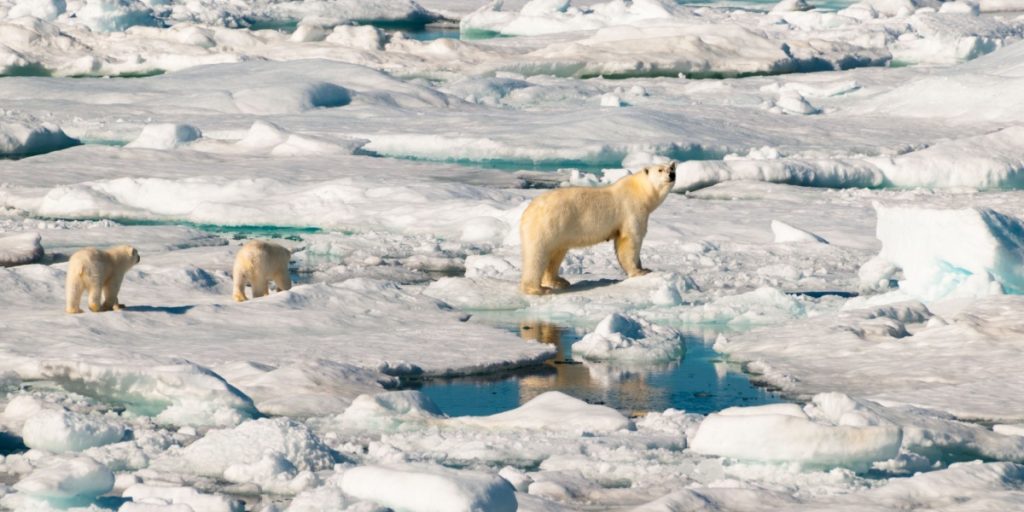A recent study warns that the Arctic might witness its first ice-free summers within the next decade.
Others are reading now
A recent study from the University of Colorado Boulder forecasts that the Arctic might experience its first ice-free summer days within the next few years, sooner than previously expected.
Earlier Than Expected
Published on March 5 in Nature Reviews Earth & Environment, the research indicates that ice-free days could occur over a decade earlier than past estimates, which mainly focused on periods extending a month or more without ice. This pattern is predicted to hold true regardless of future emission scenarios.
By the middle of the century, the Arctic could face a month without sea ice every September, its lowest ice coverage period. Towards the century’s end, the region might endure several ice-free months annually, with the duration heavily influenced by the volume of future emissions. In a scenario of high emissions, or business-as-usual, the planet’s northernmost region could see ice-free periods extending to some winter months as well.
What Does “Ice-Free” Mean?
For scientists, an “ice-free” Arctic doesn’t mean devoid of all ice.
Also read
Instead, they define the Arctic as ice-free when its sea ice coverage falls below 1 million square kilometers (386,000 square miles). This threshold is less than 20% of its seasonal minimum coverage in the 1980s.
As of late, the Arctic Ocean’s sea ice has shrunk to around 3.3 million square kilometers (1.3 million square miles) at its September minimum.
The Study’s Findings
Alexandra Jahn, associate professor of atmospheric and oceanic sciences and fellow at CU Boulder’s Institute of Arctic and Alpine Research, decided to look closely at what other scientists have said about sea ice melting. She and her team also analyzed sea ice coverage data from computational climate models to assess how the Arctic might change daily in the future.
They discovered that the Arctic might have its first day with less than 1 square kilometer of ice much sooner than previously thought — about four years earlier than expected from looking at monthly data, and in some cases, up to 18 years earlier.
“When it comes to communicating what scientists expect to happen in the Arctic, it is important to predict when we might observe the first ice-free conditions in the Arctic, which will show up in the daily satellite data,” Jahn said.
Her team’s work suggests that the Arctic Ocean could become ice-free in late August or early September, sometime from the 2020s to 2030s, no matter how much pollution we put into the air.
Impacts of Melting Sea Ice
According to Jahn, the main cause of the melting sea ice in the Arctic is the increase in greenhouse gas emissions.
This warming results in less snow and ice, leading the ocean to absorb more sunlight, speeding up the ice melt and the warming of the Arctic. This not only affects the habitat of Arctic animals like seals and polar bears, which depend on the ice, but also might allow non-native fish species to enter the Arctic Ocean, with uncertain effects on the ecosystem. The loss of sea ice also threatens coastal communities by increasing ocean waves, which can lead to coastal erosion.
Looking ahead, Jahn explained that the future frequency of ice-free conditions in the Arctic is tied to our emissions levels.
Under moderate emissions, the Arctic might only see ice-free periods during late summer and early fall. In contrast, with high emissions, the Arctic could be ice-free for as long as nine months by the end of the century, significantly altering the region’s environment.
“This would transform the Arctic into a completely different environment, from a white summer Arctic to a blue Arctic. So even if ice-free conditions are unavoidable, we still need to keep our emissions as low as possible to avoid prolonged ice-free conditions,” Jahn stated.
Hope for Recovery
The positive news is that Arctic sea ice can recover relatively quickly if global temperatures are lowered.
“Unlike the ice sheet in Greenland that took thousands of years to build, even if we melt all the Arctic sea ice, if we can then figure out how to take CO2 back out of the atmosphere in the future to reverse warming, sea ice will come back within a decade,” said Jahn.
The study received funding from the U.S. National Science Foundation, the Alexander von Humboldt Foundation, and NASA.


